Service
The 45th Illinois Infantry was organized at Galena, Illinois (coincidentally the hometown of leading Union general Ulysses S. Grant), and mustered into Federal service on December 25, 1861. It took its name from Elihu B. Washburne who represented northwestern Illinois in the United States House of Representatives and from the fact that mining lead was a well established industry in northwestern Illinois.
One member of the regiment, Wilbur Fisk Crummer, wrote a book about experiences titled With Grant at Donelson, Shiloh and Vicksburg . [1] Crummer's service ended in July 1863 when he was wounded and the book does not cover what happened to the 45th after that time. Crummer records that at the Battle of Shiloh, the 45th was approached by an unidentified regiment. The officers of the 45th decided these were Union troops and ordered the men to hold their fire. However, it was a Confederate regiment, and they were able to get quite close before releasing a devastating volley on the 45th. Crummer later wrote that at the Battle of Jackson, Mississippi, Confederate Minié balls were fired into beehives, and angry bees caused several Union companies to retreat.
In the summer of 1863, the 45th was stationed near the Shirley house at Vicksburg (Crummer was wounded by Confederate sharpshooter while writing out a report in the Shirley house). When Union forces captured Vicksburg, the regiment was given the advance of the Union army for meritorious service and had the honor of being the first Federal regiment to march into Vicksburg, where the regiment's national flag was raised at the Vicksburg courthouse.
In Dec 1863, the 45th was located at Black River, MS
The regiment was mustered out on July 12, 1865 at Louisville, KY.
The 16th Wisconsin Infantry Regiment was a volunteer infantry regiment that served in the Union Army during the American Civil War. For much of the war, the regiment was commanded by Cassius Fairchild, the brother of Wisconsin's 10th governor Lucius Fairchild.

The 8th Illinois Infantry Regiment was an infantry regiment that served in the Union Army during the American Civil War.

The 12th Iowa Infantry Regiment was an infantry regiment that served in the Union Army during the American Civil War.

The 33rd Illinois Infantry Regiment was an infantry regiment from Illinois that served in the Union Army during the American Civil War. A number of the soldiers were college students and graduates, and for a time the regiment included a 17-piece band. The unit fought at Fredericktown in 1861, Cotton Plant in 1862, the Vicksburg campaign and Fort Esperanza in 1863, and at Spanish Fort in 1865. The original enlistees were mustered out in October 1864 while the veterans and recruits were mustered out in December 1865.
The 30th Regiment Illinois Volunteer Infantry was an infantry regiment that served in the Union Army during the American Civil War.

The 9th Illinois Infantry Regiment was an infantry regiment that served in the Union Army during the American Civil War.
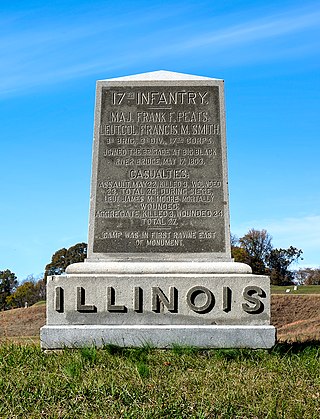
The 17th Regiment Illinois Volunteer Infantry was an infantry regiment that served in the Union Army during the American Civil War.
The 18th Regiment Illinois Volunteer Infantry was an infantry regiment that served in the Union Army during the American Civil War.
The 41st Regiment Illinois Volunteer Infantry was an infantry regiment that served in the Union Army during the American Civil War.
The 53rd Regiment Illinois Volunteer Infantry was an infantry regiment from Illinois that served in the Union Army during the American Civil War. The regiment fought at Shiloh, Hatchie's Bridge, Vicksburg, the March to the Sea, the Carolinas campaign, and Bentonville. After the war ended, it participated in the Grand Review of the Armies before being mustered out of service.

Jasper Adalmorn Maltby was a general in the Union Army during the American Civil War. He participated in two important campaigns in the Western Theater, including the Vicksburg Campaign in 1863. A talented gunsmith, Maltby was the inventor of one of the first telescopic sights.
Isaac Campbell Pugh was a United States volunteer soldier who was a veteran of the Black Hawk War, the Mexican–American War and the American Civil War; rising to the rank of Brevet brigadier general.
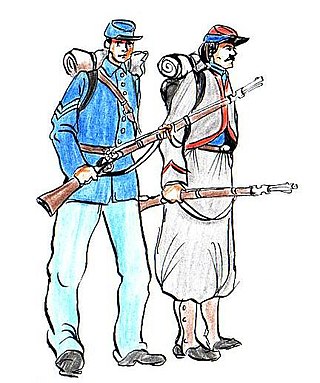
The 11th Indiana Zouaves was an infantry regiment that served in the Union Army during the American Civil War.
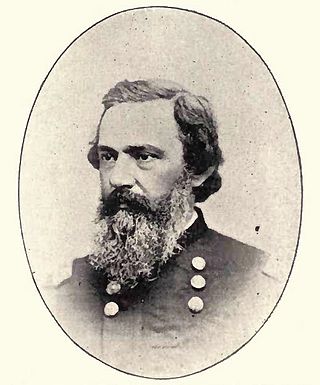
John Eugene Smith (1816-1897) was a Swiss immigrant to the United States, who served as a Union general during the American Civil War.

Hermann Lieb was a Swiss immigrant to the United States who served in the Union Army during the American Civil War. He is best remembered as the commander of the Union forces at the Battle of Milliken's Bend in 1863.
The 58th Ohio Infantry Regiment was an infantry regiment in the Union Army during the American Civil War.

Isham Nicholas Haynie (1824-1868) was a lawyer, politician, soldier and officer in the Union Army during the American Civil War. He was colonel of the 48th Illinois Volunteer Infantry Regiment at the battles of Fort Donelson and Shiloh.
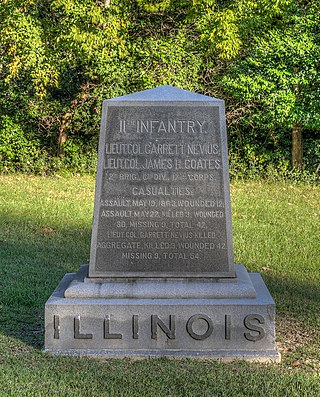
The 11th Regiment Illinois Volunteer Infantry was an infantry regiment from Illinois that served in the Union Army during the American Civil War. In April 1861, it was formed as a three-month volunteer unit, and in July 1861 it was reorganized as a three-year unit, in which role it served until the end of the war. Two of its commanding officers were promoted to brigadier general and led major units during the war. In its first major action at Fort Donelson the regiment suffered terrible losses. The 11th Illinois also fought at Shiloh, Riggins Hill, Vicksburg, First Yazoo City, Second Yazoo City, and Fort Blakeley. In April 1863, the 109th Illinois Infantry Regiment was disbanded and its enlisted men transferred into the 11th Illinois. The regiment was mustered out of service in July 1865.

William Ruben Rowley, was a lieutenant colonel and Military Secretary on the staff of General Ulysses S. Grant during the American Civil War later being brevetted a brigadier general. After moving from New York to Galena, Illinois, he taught in the local school, while also becoming involved in local politics. While living in Galena, Rowley was a neighbor and good friends with Ulysses Grant and John Rawlins before and at the time the Civil War broke out. Under General Grant he fought in the Battle of Shiloh and during the siege at Vicksburg. He was one of nine Civil War generals that came from Galena. After serving in the Union Army he returned to Galena and service in political life. Rowley was among several officers who wrote letters for and rigorously defended Grant against accusations from rivals and reporters that Grant was drinking at the Battle of Shiloh, a battle that he brought to victory. On other occasions during his military and political career Rowley stood by Grant during times of controversy.
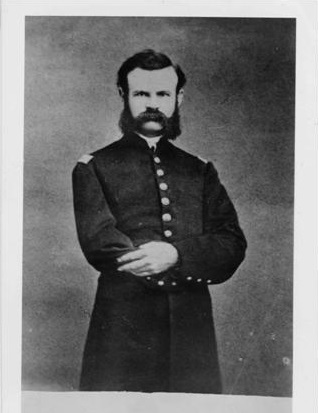
Battery F, 2nd Illinois Light Artillery Regiment was an artillery battery from Illinois that served in the Union Army during the American Civil War. The battery was organized in December 1861 at Cape Girardeau, Missouri. The unit fought at Shiloh, First Corinth, and Second Corinth in 1862 and at Vicksburg and Jackson in 1863. The battery served in the Atlanta campaign and at Nashville in 1864. It was mustered out of federal service in July 1865. The battery's first commander was John Wesley Powell who later led an exploration of the Grand Canyon.
This page is based on this
Wikipedia article Text is available under the
CC BY-SA 4.0 license; additional terms may apply.
Images, videos and audio are available under their respective licenses.













